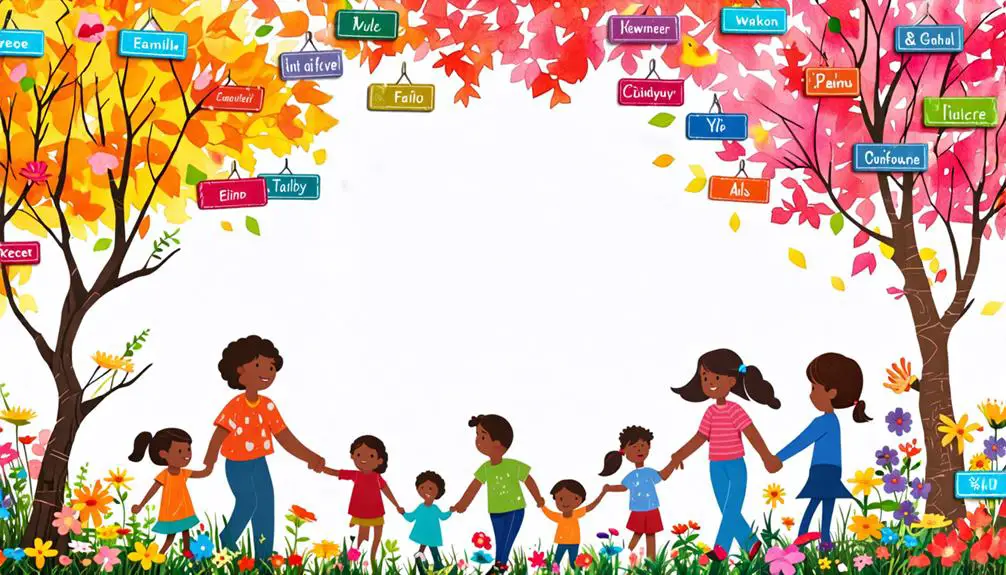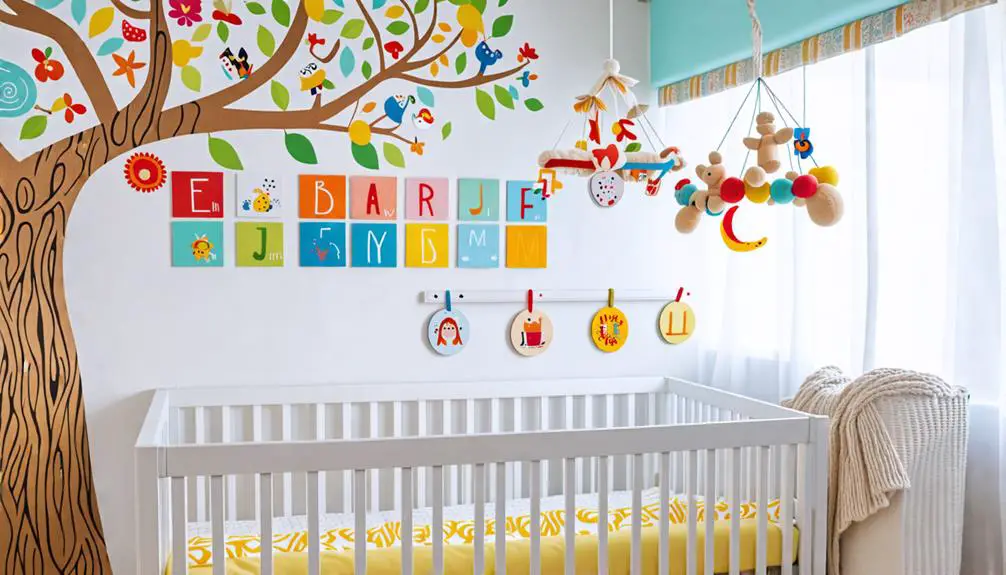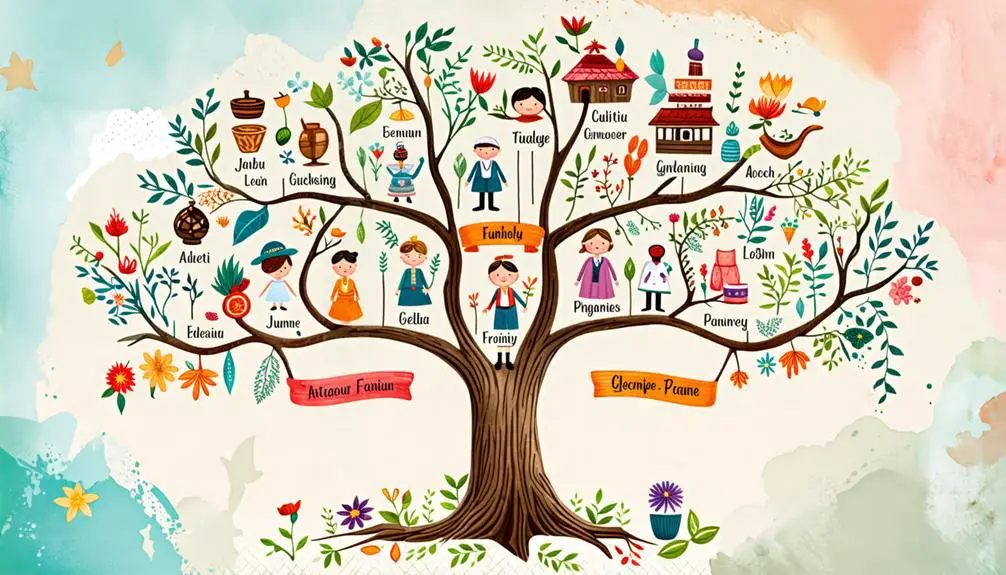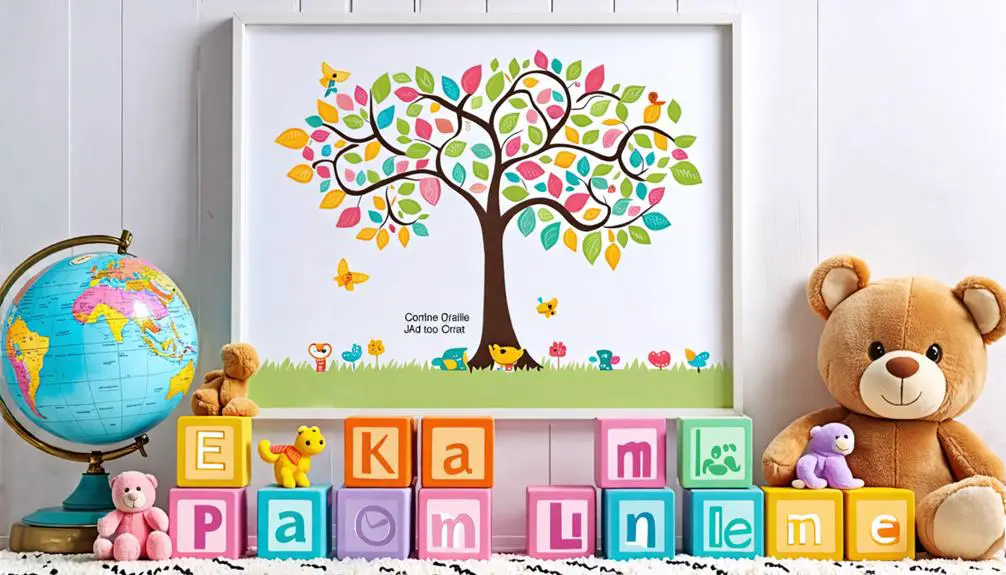Unique Baby Naming Ideas for Blended Families
Blended families can explore unique naming ideas that celebrate their diverse backgrounds and foster unity. Reflect on hyphenated or combined names to reflect both parents' identities. You might involve existing children in the process, ensuring everyone feels included. Look for names that hold emotional significance or cultural roots, creating a shared sense of belonging. You could also blend traditional names with modern twists or choose nature-inspired options for a neutral ground. Open communication will help address preferences and connect each family member. By mixing and matching ideas, you can craft the perfect name that resonates—there's much more to reflect on as you choose!
Understanding Blended Family Dynamics

Understanding blended family dynamics is essential for maneuvering the unique challenges that arise when choosing a name for a new child amidst diverse preferences.
In a blended family, children from previous relationships often have their own naming styles and attachments, complicating the decision-making process. Effective communication becomes imperative, as it helps you navigate emotional investments in names that can vary considerably among family members.
Open discussions not only address naming disagreements but also foster a sense of unity, alleviating concerns from existing children about their new sibling's name.
Inclusivity plays a significant role, with many families opting for hyphenated or combined names, reflecting both parents' identities and promoting equality within the blended family structure.
Overcoming Naming Challenges
Steering the naming process in a blended family often brings its own set of challenges, but with open communication and a collaborative approach, you can find a name that honors everyone's preferences.
Begin by discussing each family member's attachment to certain names, understanding that emotional investments may differ.
To create a name that will make everyone feel included, consider compromise strategies, like selecting names that blend both partners' styles or using unique spellings.
Involve existing children in the conversation to foster inclusion and reduce feelings of alienation.
Ultimately, explore neutral or trend-aware names that reflect both parents' tastes, facilitating a smoother naming process and strengthening family bonds from the start.
Creative Name Options

Finding creative name options can transform the naming journey into a fun and memorable experience for your blended family.
Consider combining traditional names with modern twists, which can bridge different naming styles. Unique spellings or variations of popular names, like Steaphan for Stephen or Kaia for Maya, can provide a distinctive yet relatable choice for your child.
Nature-inspired names, such as Meadow or River, can resonate with everyone and offer a neutral ground for selection. You might also think about incorporating nicknames or shortened forms of longer names, like Aurelia to Rory or Josephine to Josie, to create a friendly atmosphere.
Ultimately, the goal is to choose names that everyone feels a connection to, promoting unity in your family.
Incorporating Cultural Influences
Incorporating cultural influences into your baby's name can create a meaningful connection to your family's heritage and traditions. By choosing names like Aisling, which means 'dream' in Irish, or Leif, meaning 'heir' in Scandinavian, you honor your roots while adding a unique touch.
Mythological names such as Freya or Orion not only reflect cultural influences but also introduce your child to fascinating stories. Consider regional variations too; names like Anouk and Thora resonate with families seeking distinctive options.
Understanding the significance of these names fosters a sense of identity and belonging in children, promoting inclusivity and appreciation for their diverse heritage. Ultimately, blending cultural influences enriches your child's name and identity.
Strategies for Compromise

Steering the naming process together can help both parents feel heard and lead to a compromise that reflects their shared values and preferences.
Start by establishing open communication about your naming preferences to identify common ground.
Create a combined list of acceptable names, highlighting options that bridge your differing styles.
Consider names that honor family heritage or carry personal significance; this can foster mutual respect.
Exploring unique or shortened versions of names allows both parents to feel included while respecting individual preferences.
Additionally, seek input from children in the family.
Their involvement promotes inclusivity and guarantees everyone feels valued in the naming process, making it easier to reach a consensus on the perfect name.
Emotional Significance of Names
Understanding the emotional significance of names can help parents navigate the complexities of choosing a name that honors both their backgrounds and their child's future.
In blended families, names often evoke strong feelings tied to personal history, cultural heritage, and familial connections. Each parent may have unique emotional attachments, which can lead to conflicts during naming discussions.
Open communication about these feelings is essential; it fosters understanding and collaboration. By acknowledging the emotional significance of names, you can respect each other's perspectives and create a sense of unity.
Ultimately, the name you choose will represent the hopes, values, and identity you wish to impart on your child, making this decision even more meaningful within the blended family dynamic.
Unique Naming Traditions

Blended families often embrace unique naming traditions that merge elements from both parents' heritages, creating a richer family identity.
One popular approach is using hyphenated names, allowing children to carry both parents' surnames and giving them a choice in their identity as they grow.
You might also consider combining parts of each parent's name to create a new surname, reflecting your modern family dynamics.
Additionally, many families honor grandparents or significant relatives by using their names as middle names, fostering continuity and connection across generations.
Open discussions with your partner and children about naming preferences can lead to innovative solutions that respect everyone's feelings, enhancing your family's unity and shared identity.
Engaging the Family in Choices
Involving the entire family in the naming process not only fosters inclusion but also strengthens bonds as everyone contributes to a name that reflects their shared identity and heritage. Open discussions about naming preferences can reveal emotional attachments and create a sense of unity. Here's a simple way to engage everyone:
| Method | Description |
|---|---|
| Family Voting | Create a shortlist and let everyone vote. |
| Share Personal Stories | Discuss why certain names matter to you. |
| Honor Family Traditions | Incorporate names that hold significance. |
This collaborative approach provides essential Name Help, ensuring each member feels valued. By setting criteria like uniqueness and cultural significance, you streamline the process, making it easier to find a name that embodies the family's blended history.
Conclusion
In the beautiful chaos of blended families, choosing a name can feel overwhelming, but it's also an opportunity to create something special together.
Remember how your child's laughter echoed during that family gathering, uniting everyone? Let that moment inspire your naming journey.
By blending traditions, cultures, and personal stories, you're crafting a unique identity for your little one that honors everyone involved.
Embrace the love and connection, and you'll find the perfect name that resonates with your hearts.







